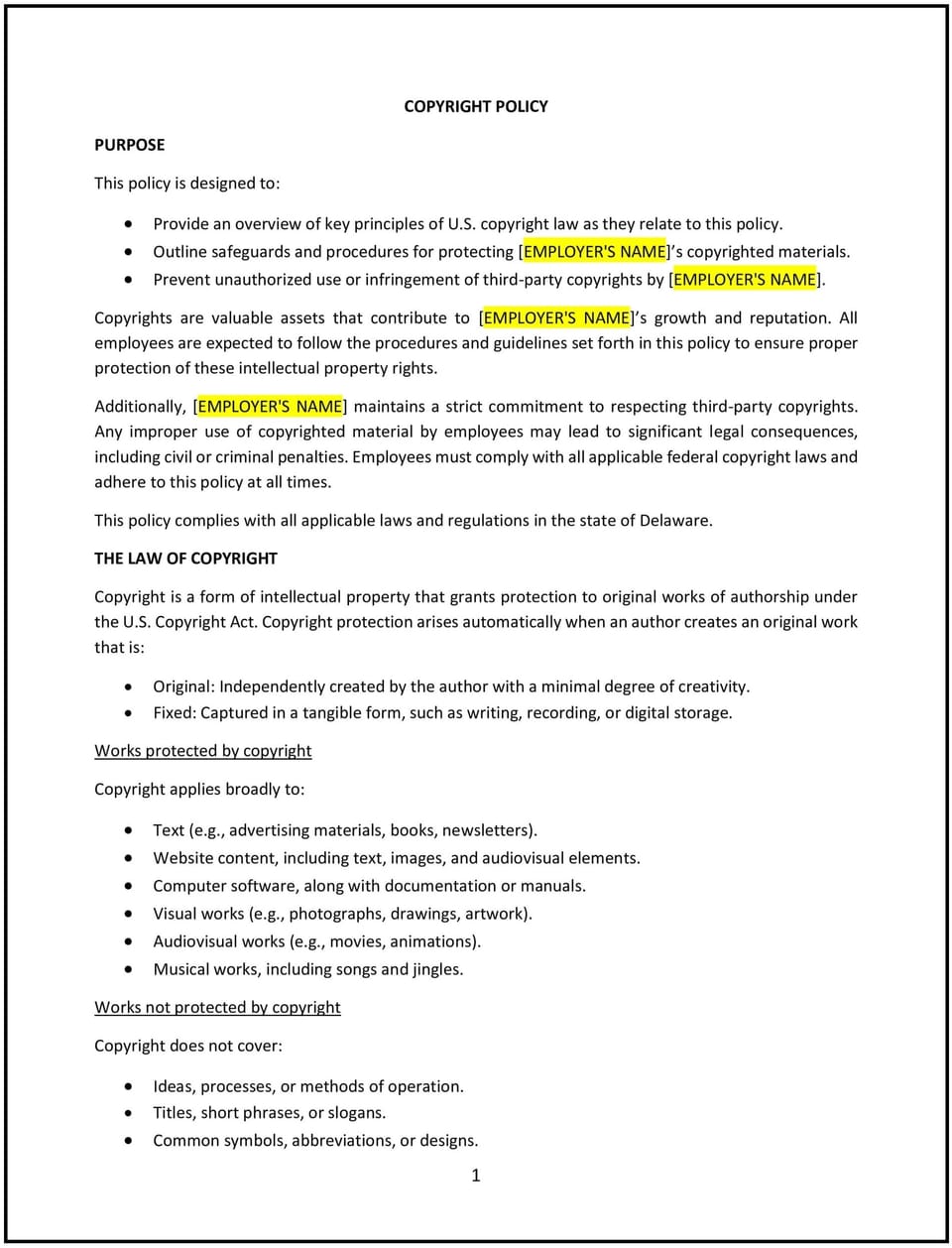Copyright policy (Delaware): Free template

Copyright policy (Delaware)
A copyright policy helps Delaware businesses protect their intellectual property and ensure compliance with copyright laws. This policy outlines guidelines for using, creating, and managing copyrighted materials, as well as procedures for addressing copyright violations and respecting the rights of others.
By implementing this policy, businesses can safeguard their assets, reduce legal risks, and promote responsible use of intellectual property.
How to use this copyright policy (Delaware)
- Define ownership rights: Specify the company’s ownership of materials created by employees or contractors within the scope of their work.
- Provide usage guidelines: Outline how employees can use copyrighted materials, including restrictions on unauthorized use or reproduction.
- Address third-party materials: Require employees to obtain permission or licenses for using third-party copyrighted works in company projects.
- Establish reporting procedures: Provide a clear process for reporting suspected copyright violations, whether internal or external.
- Implement training: Educate employees on copyright laws, fair use principles, and the consequences of infringement.
- Monitor compliance: Regularly review company practices to ensure adherence to copyright laws and address any gaps in compliance.
Benefits of using this copyright policy (Delaware)
This policy offers several benefits for Delaware businesses:
- Protects intellectual property: Ensures company-owned creations are safeguarded against unauthorized use or reproduction.
- Reduces legal risks: Helps businesses comply with Delaware and federal copyright laws, minimizing the potential for disputes or penalties.
- Promotes ethical practices: Encourages employees to respect copyright laws and use materials responsibly.
- Enhances operational clarity: Provides clear guidelines for creating, using, and sharing copyrighted materials within the company.
- Supports brand integrity: Protects original content, ensuring it is used appropriately and aligns with the company’s values.
Tips for using this copyright policy (Delaware)
- Communicate the policy effectively: Ensure employees understand their responsibilities regarding copyright compliance and intellectual property use.
- Provide access to resources: Offer tools and guidelines for obtaining copyright permissions or licenses when needed.
- Address evolving needs: Regularly update the policy to reflect changes in copyright laws or company practices.
- Enforce consistently: Take appropriate actions to address copyright violations and prevent repeat offenses.
- Educate employees: Conduct periodic training to keep employees informed about copyright laws and the importance of compliance.
Q: Why is a copyright policy important for my business?
A: A copyright policy helps protect the company’s intellectual property, ensures compliance with copyright laws, and provides clear guidelines for using and managing copyrighted materials.
Q: What types of materials are covered under this policy?
A: The policy applies to all copyrighted materials, including written content, images, videos, software, and any other works protected by copyright laws.
Q: How can employees use third-party copyrighted materials?
A: Employees must obtain permission or appropriate licenses before using third-party materials in company projects, unless the use qualifies as fair use under copyright laws.
Q: What should my business do if it identifies a copyright violation?
A: The policy should outline procedures for reporting and addressing copyright violations, including investigating the issue and taking corrective actions as needed.
Q: How often should this policy be reviewed?
A: This policy should be reviewed annually or whenever Delaware laws or federal copyright regulations change to ensure continued relevance and compliance.
This article contains general legal information and does not contain legal advice. Cobrief is not a law firm or a substitute for an attorney or law firm. The law is complex and changes often. For legal advice, please ask a lawyer.


